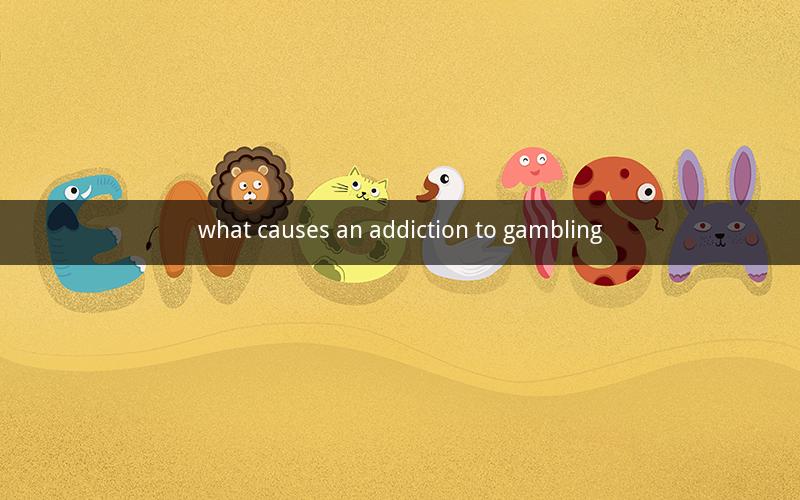
Directory
1. Introduction to Gambling Addiction
2. Psychological Factors Contributing to Gambling Addiction
3. Social and Environmental Influences on Gambling Addiction
4. Genetic Factors and their Role in Gambling Addiction
5. Economic Impact of Gambling Addiction
6. Treatment and Intervention for Gambling Addiction
7. The Role of Society in Combating Gambling Addiction
8. Conclusion
1. Introduction to Gambling Addiction
Gambling addiction, also known as compulsive gambling, is a behavioral disorder characterized by the inability to control or stop gambling despite negative consequences. This addiction affects individuals from all walks of life, and its prevalence is on the rise globally. Understanding the causes of gambling addiction is crucial in addressing the issue effectively.
2. Psychological Factors Contributing to Gambling Addiction
Several psychological factors can contribute to the development of gambling addiction. These include:
- Impulse Control Disorders: Individuals with impulse control disorders are more susceptible to developing gambling addiction due to their inability to resist impulses.
- Mental Health Disorders: Depression, anxiety, and other mental health issues can lead individuals to seek relief through gambling, making them more vulnerable to addiction.
- Personality Traits: Certain personality traits, such as impulsivity, risk-taking, and thrill-seeking behavior, can predispose individuals to gambling addiction.
3. Social and Environmental Influences on Gambling Addiction
Social and environmental factors also play a significant role in the development of gambling addiction. These include:
- Access to Gambling: Easy access to gambling facilities, such as casinos, online platforms, and mobile applications, increases the risk of addiction.
- Cultural Factors: Cultural norms and attitudes towards gambling can influence an individual's likelihood of developing an addiction.
- Peer Influence: Peer pressure and socializing with individuals who engage in excessive gambling can lead to the adoption of similar behaviors.
4. Genetic Factors and their Role in Gambling Addiction
Genetic factors contribute to the susceptibility of individuals to gambling addiction. Research suggests that certain genetic markers are associated with a higher risk of developing this addiction. However, genetics alone do not determine whether an individual will become addicted; environmental and psychological factors also play a crucial role.
5. Economic Impact of Gambling Addiction
Gambling addiction has a significant economic impact on individuals, families, and society as a whole. This includes:
- Financial Loss: Individuals with gambling addiction often experience severe financial losses, leading to debt, bankruptcy, and other economic consequences.
- Reduced Productivity: The time and energy spent on gambling can lead to decreased productivity in both personal and professional life.
- Social Costs: The social costs associated with gambling addiction, such as increased crime rates and strained family relationships, can burden society.
6. Treatment and Intervention for Gambling Addiction
Effective treatment and intervention are essential for addressing gambling addiction. These may include:
- Cognitive Behavioral Therapy (CBT): CBT helps individuals recognize and change their gambling-related thoughts and behaviors.
- Support Groups: Joining support groups, such as Gamblers Anonymous, can provide individuals with a sense of community and shared experiences.
- Professional Help: Consulting with a mental health professional, such as a psychologist or therapist, can offer personalized treatment and support.
7. The Role of Society in Combating Gambling Addiction
Society plays a crucial role in combating gambling addiction through various measures, such as:
- Education and Awareness: Raising awareness about the risks and consequences of gambling addiction can help individuals make informed decisions.
- Regulation: Implementing strict regulations on gambling activities can reduce the accessibility and availability of gambling facilities.
- Support Services: Providing accessible and effective support services for individuals struggling with gambling addiction can help them overcome their addiction.
8. Conclusion
Understanding the causes of gambling addiction is essential in addressing the issue effectively. By identifying the various factors contributing to addiction, individuals, families, and society can work together to prevent, treat, and overcome this challenging disorder.
Questions and Answers
1. Q: What are the primary psychological factors contributing to gambling addiction?
A: The primary psychological factors include impulse control disorders, mental health disorders, and personality traits such as impulsivity and risk-taking behavior.
2. Q: How do social and environmental factors influence gambling addiction?
A: Social and environmental factors such as easy access to gambling, cultural norms, and peer influence can increase the risk of developing a gambling addiction.
3. Q: What is the role of genetics in gambling addiction?
A: Genetics play a role in the susceptibility to gambling addiction, with certain genetic markers being associated with a higher risk.
4. Q: What are the economic consequences of gambling addiction?
A: The economic consequences include financial loss, reduced productivity, and increased social costs.
5. Q: What treatment options are available for gambling addiction?
A: Treatment options include cognitive behavioral therapy (CBT), support groups, and professional help from mental health professionals.
6. Q: How can society combat gambling addiction?
A: Society can combat gambling addiction through education and awareness, strict regulations, and accessible support services.
7. Q: Can gambling addiction be completely cured?
A: While complete cure may not always be possible, individuals can manage their addiction through effective treatment and support.
8. Q: What are the warning signs of gambling addiction?
A: Warning signs include secretive behavior, financial difficulties, increased time spent on gambling, and neglecting personal and professional responsibilities.
9. Q: How can individuals prevent gambling addiction?
A: Individuals can prevent gambling addiction by setting limits on gambling activities, seeking support when needed, and being aware of the risks.
10. Q: Is it possible for someone to recover from gambling addiction on their own?
A: While it is possible for some individuals to recover on their own, seeking professional help and support from others can significantly improve the chances of successful recovery.